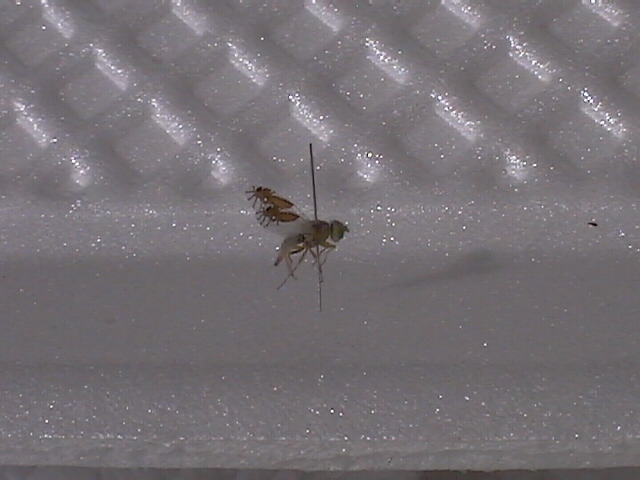In January 2002, members of the Al Ain chapter of the Emirates Natural
History Group traveled to the Jazirah oasis to study the plant and insect life
and to gather some oranges for the marmalade making competition.
In the course of the walk along the wadi, Brigitte Howarth came upon an
oleander shrub and made a most interesting discovery: amid an infestation of
insects was a small fly with decorated wings. The picture wing fly had
established a symbiotic relationship with the ants which, in turn, had
established a relationship with smaller insects which had infested the shrub.
Below is the announcement by Brigitte with a copy of a photograph.
What a wonderful oasis Jazira is - I'm enthralled every time I go there.
On the bug front, it was quite successful for both photography and
collecting. I collected a variety of bugs, one of which is very fascinating and
warrants to be highlighted. But first a little introduction.
On our walk along the wadi I stopped at an oleander shrub quite badly
infested with very small scale insects. The shrub also had a variety of other
insect life of interest, including some ants 'farming' another species of scale
insect - a symbiotic relationship where both bugs benefit as the ants protect
their 'flock' in return for milking the scale insects which produce a sweet
honeydew excretion when tickled. The oleander also supported some leaf hoppers,
solitary wasps, beeflies, and many others.
However, there was one insect which made me look twice. When I realised it
was a fly I had to chuckle to myself as, sitting on a green leaf, the insect was
barely visible apart from some darkening on the wings. The fly was small,
approx. 6 mm in length with a grey-greenish body, iridescent green eyes, and
clear wings apart from the darkening mentioned. On closer inspection the
patterns appear to depict an insect! So, when the insect is sitting at rest on a
leaf you see two small insects on the leaf rather than the fly!!! It's
incredible how such a pattern would evolve but it obviously is of some benefit
to the fly to be inconspicuous apart from its wings which sport insects. The
protection could be to fool predators which might see the pattern but not the
fly and thus give the fly some vital seconds to evade the predator.
Would this sort of protection be more beneficial to the insect in contrast to
being totally inconspicuous? In my opinion yes, as some predators are very good
at becoming specialised in foraging on one type of prey, even if this prey is
trying to evade it. Thus, if the movement of the wings can give the prey species
time to get away, it must be better than being gobbled up by a specialised
predator!
By the way, the fly belongs to a family called 'picture wing flies' (Tephritidae).
However, a wing 'picture', resembling an insect, I have not seen before today!!!
The specimen now resides in our collection and will be on display for you to see
in the near future.
Brigitte Howarth
